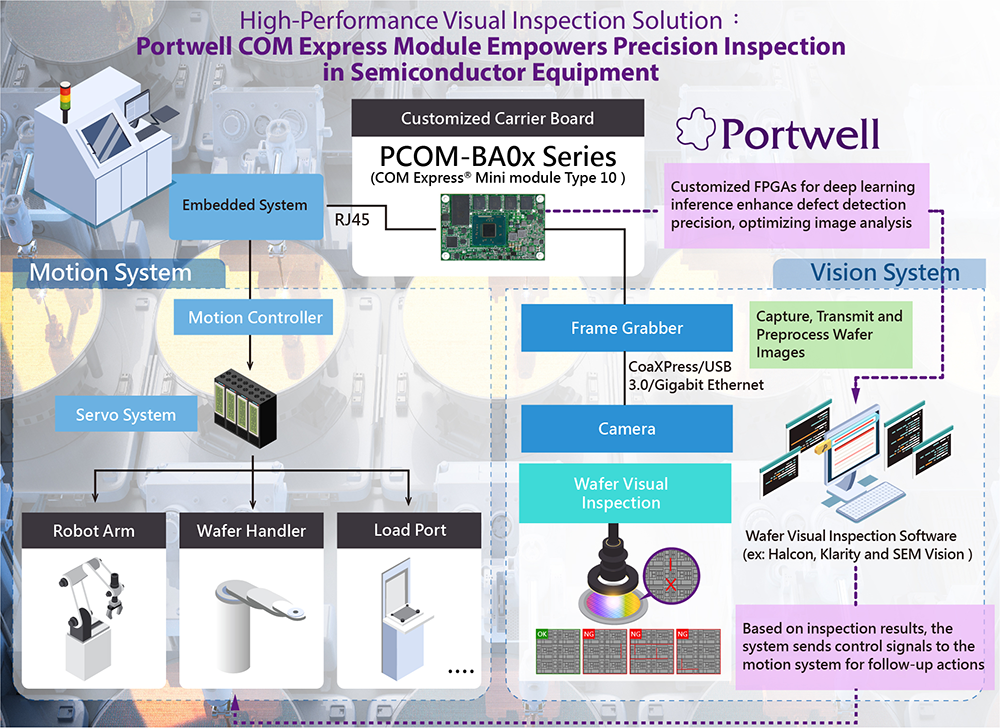
In the semiconductor manufacturing sector, visual inspection is a critical step to ensure product yield. As process technology continues to advance, semiconductor equipment demands increasingly high-performance computing, real-time processing capabilities, and system flexibility. Visual inspection in semiconductor processes requires handling high-resolution images and performing real-time analysis and defect detection, placing significant demands on the system’s computing power. Particularly as wafer defect sizes shrink and inspection precision increases, traditional embedded systems face heavier computational burdens and often struggle to meet these demands. Semiconductor equipment typically requires long-term operation, yet rapid technological advancements can quickly render hardware obsolete. If a computing module needs to be replaced, traditional embedded systems often require a complete system overhaul, making it difficult to meet future upgrade needs.
The core advantage of the COM Express module lies in its modular design, which separates the computing core from the I/O interfaces, providing the system with exceptional flexibility and scalability. In semiconductor equipment, visual inspection systems need to process large amounts of image data and perform real-time analysis and defect detection. The Portwell PCOM-BA0x Series, part of the COM Express® Mini module Type 10 series, adopts a high-performance, low-power processor architecture with excellent computing capabilities and dynamic frequency adjustment technology, fully addressing real-time data processing needs. Its flexible expansion interface design supports multiple high-speed transmission standards and peripheral device connections, ensuring outstanding performance in image capture and data transmission applications for semiconductor equipment.
In this wafer visual inspection project, the customer’s self-configured camera transmits high-resolution image data through interfaces (CoaxPress, USB 3.0, or Gigabit Ethernet) to an image capture card. The image capture card then transfers the data via a PCIe interface to the PCOM-BA0x Series COM Express module, which is equipped with a custom FPGA. This allows the customer to use wafer visual recognition software for image processing and inference analysis, enabling high-performance image data preprocessing and acceleration. The custom PCIe interface provides high bandwidth and low latency, ensuring real-time data transmission. The built-in eMMC storage, with a capacity of up to 256GB, ensures the preservation and integrity of large volumes of image data. After recognition, the data is transmitted through various high-speed transmission standards to external devices such as displays, storage devices, or control systems. Through real-time image processing, the system can classify wafers that do not meet quality standards based on the results, achieving synchronous inspection and classification accuracy. Remote monitoring and management ensure real-time system status feedback and fault diagnosis.
The series modules have a power consumption range of only 6W to 12W. The low-power design significantly reduces energy consumption, which is particularly important for semiconductor production environments requiring long-term operation. Lower power consumption means reduced electricity demands, thereby lowering operational costs.
The LPDDR5 SDRAM memory is mounted directly on the module, supporting a wide temperature range of -40°C to 85°C. In semiconductor manufacturing environments, equipment often operates at high speeds. The vibration-resistant design ensures system stability in such conditions, preventing data loss or hardware damage due to vibrations. The wide-temperature operation capability allows the system to adapt to extreme temperatures in cleanrooms or outdoor environments, ensuring reliable operation.
The onboard LPDDR5 SDRAM memory supports up to 16GB, providing high-speed data access to ensure real-time processing of large volumes of image data. The built-in eMMC storage, with a capacity of up to 256GB, ensures the preservation and integrity of large amounts of image data. This is crucial for semiconductor production environments that require long-term operation and recording of inspection results.
Support for Intel® TCC/TSN technology, coupled with a 2.5GbE high-speed network interface, enables real-time computing and high-speed network transmission for rapid image data analysis and remote monitoring. This ensures precision and real-time performance in visual capture and analysis processes within semiconductor equipment, particularly in applications requiring remote monitoring and control.
Notably, the modular design of the PCOM-BA0x Series allows customers to easily upgrade to other products in the same series in the future, significantly reducing upgrade costs and time investment. This provides customers with long-term investment security and operational convenience. Whether facing the high-precision demands of semiconductor equipment or the real-time processing challenges of visual inspection systems, the PCOM-BA0x Series, with its low power consumption, vibration resistance, wide-temperature adaptability, and future scalability, meets the diverse needs of industrial applications.
Portwell not only provides high-performance hardware products but also offers comprehensive support through its DMS (Design and Manufacturing Services) value-added services. In this project, Portwell optimized and customized the PCOM-BA0x Series based on customer requirements. To meet the customer’s storage needs, Portwell provided a high-capacity embedded storage solution and assisted with operating system deployment, significantly simplifying the customer’s system integration process and reducing product delivery time to 4-6 weeks. Additionally, Portwell offered customized BIOS services tailored to the customer’s specific application scenarios, optimizing system expansion interface configurations to better support the customer’s FPGA-based equipment. This enabled the PCOM-BA0x Series to adapt to various application scenarios and deliver maximum performance. In testing and after-sales services, Portwell demonstrated exceptional professionalism and efficiency. From product testing to post-sales support, the Portwell team consistently prioritized customer needs, ensuring system stability. Through these customized services and technical support, Portwell successfully assisted the customer in achieving high-performance collaboration in semiconductor visual inspection systems, enhancing real-time processing capabilities, improving production yield, and providing long-term technical assurance and competitive advantages.
To provide the best experiences, we and our partners use technologies like cookies to store and/or access device information. Consenting to these technologies will allow us and our partners to process personal data such as browsing behavior or unique IDs on this site and show (non-) personalized ads. Not consenting or withdrawing consent, may adversely affect certain features and functions.
Click below to consent to the above or make granular choices. Your choices will be applied to this site only. You can change your settings at any time, including withdrawing your consent, by using the toggles on the Cookie Policy, or by clicking on the manage consent button at the bottom of the screen.